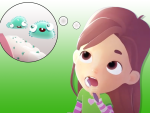It’s a rite of passage that every child goes through – losing their baby (also known as milk, deciduous or primary) teeth. The thought of pulling out pieces of our mouth can be a scary one for a child or even an adult to think about – but what can help the shock is understanding why it is happening.
As we grow up, our body grows as well – and just like our arms and legs get bigger, so do our heads, mouths and jaws. When our bodies are finished growing, most of us have room in our mouths for 32 teeth. But as babies and children, our jaws are too small for so many chompers. That’s why we have two sets of teeth. The first set, made up of only 20 teeth, help us learn to speak and eat, get our jaws used to opening a certain amount of space so that our teeth can fit inside it, and, importantly, create a pathway for the second set of teeth to emerge.
Our second set of teeth (also known as permanent teeth) are the ones that we keep for life. Even though our baby teeth aren’t permanent, caring for them is crucial. When a baby tooth is lost too early due to decay, the surrounding teeth tend to migrate into improper positions. This can make the permanent teeth crooked or crowded when they come in.
Below, Dental Hygienist Leah talks about what to expect when you’re losing your teeth.






